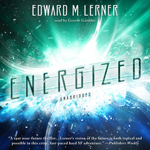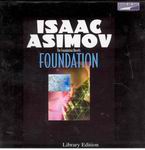
 Energized
Energized
By Edward M. Lerner; Read by Grover Gardner
Length: 10.5 hours [UNABRIDGED]
Publisher: Blackstone Audio, Inc.
Published: 2012
ISBN: 1470813033
Themes: / Science! / satellites / engineers / NASA / terrorists / oil / energy / space / thriller /
The SFFaudio crew pegged me to read this book because the description says that one of the main characters is a NASA engineer. I always think it’s funny when people specify “NASA” engineer. It’s like on TV shows when you see people working near the space shuttle, they’re all wearing NASA hats. Nobody does that. The description could just as easily said “aerospace engineer” and the meaning would be the same…but less sexy, somehow. I admit, I was weary of reading this one at first. My experience with people who write about “NASA engineers” is that they have no idea what they’re talking about excepting cursory research. I’m happy to report that Edward M. Lerner does know what he’s talking about with regards to the space and satellite stuff (looking at his bio, it’s no surprise). That said, I went into this thinking it was going to be a science fiction book. It’s much more a mystery/thriller with science fiction elements. It’s as much “science fiction” as Daemon is (which is to say, not much).
In the interest of full disclosure, it’s probably worth mentioning that I am currently employed by a company that (among other things) designs and builds satellites, both for the government and the commercial sector. I currently work on the commercial side of things and have never worked on a NASA contract. There are definite holes and inaccuracies with the science and engineering in this book. But most people won’t recognize them, and they don’t impact the overall enjoyment of the story.
That disclaimer done with, Energized was pretty entertaining. Set in the near-future United States, the world has gone through a “crude-tastrophe” and the price of oil has skyrocketed to the tune of $20+/gallon to fill up a car. There is a fixed market, controlled mostly by Russian interests, for oil, so naturally the US explores alternate energy sources. Unfortunately, Rome wasn’t built in a day and it’s virtually impossible to produce enough energy via alternate sources overnight. NASA has been working on a large-scale satellite that can beam solar energy to earth from space.
The first third of the book (maybe closer to the first half) deals with the public (and private sector) reactions to this kind of a satellite and introduces the reader (listener?) to the concept and its risks. Admittedly, this section could have been shorter without sacrificing much of the story; it did seem to drag on a bit.
The second section of the book introduces the “thriller” aspect. As anybody in the aerospace industry is aware, the stuff built “for the powers of good” in/for space can usually be used to do evil. Sure enough, terrorists find a way to take over the satellite and use its harnessed energy to destroy ground-based and air-based targets. As is typical for thrillers, there are some good guys in the area, capable of stopping the terrorists. In this case it’s Marcus Judson, NASA engineer, one of the lead consultants for the power satellite project, along with some of his colleagues. Yet again, this section seemed overly long and drawn out.
However, the length of the first two sections may only seem long in relation to the final section–the part where the final “battle” occurs and either good or evil triumphs. This part felt a bit rushed, comparatively. In retrospect, I think it was probably the right length and that the other two parts were just a bit too long. I won’t spoil it for you, but the final “battle” involves maneuvering (literally and metaphorically) on the ground and on the 2 mile-on-a-side power satellite. It stretches the belief but still left me interested and wanting to listen to see what happened next.
As I stated previously, the book was enjoyable. It was a bit far-fetched but not so far-fetched as to be completely unbelievable. The science fiction elements are there and create an atypical setting for most mystery/thriller type books, and I’d recommend this to anybody that enjoys the mystery/thriller genre.
Grover Gardner is one of my favorite narrators and he shines in this type of book. He also narrates the Andy Carpenter books, another mystery/thriller series, so it feels natural for him to read Energized. The only “weirdness” I had is that the Andy Carpenter books have a character named Marcus as well, so hearing of two very different “Marcus” characters read by the same narrator was a bit jarring at times.
All in all, this is a popcorn-type book, easily consumed and digested. It does have its flaws (with the technical side of things as well as story length), but they’re not so big as to ruin the fun. If you’re in the market for a hard science fiction book with far-reaching themes, this isn’t the book for you. But if you’re in the mood for a thriller with science fiction elements, you’ll probably enjoy Energized well enough.
Review by terpkristin.
